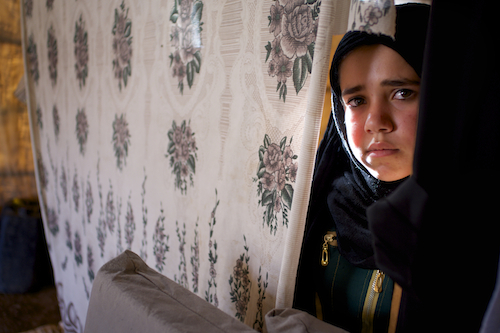
Photo: Syrian refugee girl in a tent in the Jordan Valley Picture: UNICEF/Noorani
"All the money in the whole world can not erase the death of one child." That was the sentiment of one delegate this afternoon at the Fourth International Humanitarian Pledging Conference for Syria in London.
And yet, with the conference still underway here in Westminster and with delegate after delegate taking the podium pledging new funding to meet those affected and displaced by the war in Syria, it has become increasingly clear that these pledges -- many of them focused on the longer term and education, training and employment for the displaced -- do have the potential to not only save lives, but also build futures and contribute to the stability of the region.
Coming on the heels of the breakdown of peace talks in Geneva aimed at ending Syria's five-year civil war, the billions currently being pledged is a sliver of hope that despite a lack of political solutions to actually end the war, the international community is committed to coming together to support the Syrian people and their increasingly generous neighbors. Speaking with the BBC this afternoon, Tom Fletcher, former UK Ambassador to Lebanon and Director of Global Strategy for the Global Business Coalition for Education described progress today so far as a "bright spot in a grim situation."
Over the last five years, the burden of the Syria crisis has been largely carried by neighboring countries in particular Jordan, Lebanon and Turkey who have opened up their borders, schools, hospitals, social services and budgets generously to an unprecedented influx of Syrian refugees. Since the onset of the conflict, Turkey has invested more than $6 billion in Syrian refugees. The United States by contrast, the largest single donor outside the region has contributed $4.5 billion. World Bank President Jim Kim said today of the burden these countries continue to bear, "fundamentally this is not a sustainable situation."
What countries in the region are doing to provide for these refugees Donald Tusk, President of the European Council described as the provision of a "global public good" and called on the international community to do more to invest in this public good.
A critical part of this "global public good" in these countries has been the provision of education. Despite repeated calls from campaigners and the United Nations Special Envoy for Education, Gordon Brown, for an increased focus on education for children and youth who have fled from Syria, educational opportunities in the region (as in other emergencies) have continued to be too low on the list of immediate priorities for most donors.
Today for the first time however, education was front and centre of the humanitarian response agenda. United States Secretary of State John Kerry pledged the continued support of the United States describing the crisis as something that "should tear at the conscience of all civilised people." Kerry emphasised that of the $925 million US contribution, '$290 million is new funding specifically to support schooling for 300,000 refugee youth in Jordan and Lebanon.' Borge Brende, Norwegian Minister of Foreign Affairs and well known champion of education, pledged that 15% of Norway's contributions for Syria will be focused on education and challenged other donors to do the same.
On the eve of the conference, and echoing the call of campaigners to increase commitment to education for Syrian refugees and in emergency contexts more broadly, Prime Minister David Cameron doubled the commitment of the UK to £2.4 billion, and simultaneously noted that a "new approach" and a "future model for humanitarian relief" was needed that focuses on building stability, creating jobs and providing education.
The call is for pledges today that will result in at least 1 million more children and youth in school this year -- at a total estimated cost of $1.4 billion.
The pledging continues. Watch live coverage here.
